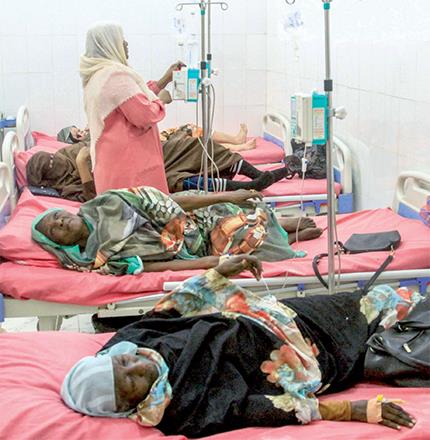
Aid Groups Press To Stop Sudan 'Man-Made' Famine As 755,000 Projected To Starve
A UN-backed study said on Thursday that 755,000 people are on the brink of starvation in Sudan, a death toll not seen since the 1980s when famine in Ethiopia shocked the world.
Barrett Alexander, the director of programmes in Sudan for Mercy Corps, said even that figure could be an underestimate as the conflict has displaced farmers in the country's agricultural areas, raising fears for the next harvest.
"Honestly, I wouldn't be surprised if it were a little bit higher than that number," he said of the projection by the Integrated Food Security Phase Classification initiative, or IPC.
"We're seeing a man-made likely famine happen in front of our eyes that's primarily conflict-induced," Alexander, who is based in Port Sudan, told AFP on a visit to Washington.
The IPC said that nearly 26 million people - half of Sudan's population - were facing acute food insecurity with the 755,000 in catastrophic conditions, including around the capital Khartoum and Darfur, the scene of a scorched-earth military campaign two decades ago.
Fighting erupted in April 2023 between the army and the paramilitary Rapid Support Forces after a plan to integrate them failed, with the warring generals seizing territory.
Alexander said that both sides have imposed cumbersome levels of bureaucracy, including requiring permits of aid workers.
"Getting across the frontlines is nearly impossible," he said.
Eating grass
Eatizaz Yousif, Sudan country director for the International Rescue Committee, said there have already been accounts of people resorting to eating grass in South Kordofan state.
"Definitely we will be seeing very soon people dying from a lack of food in different parts of the country," said Yousif, who was also in Washington.
She said that the belligerents have looted food warehouses and harassed or killed humanitarian workers.
“It's definitely a man-made hunger crisis because we don't have a problem with the level of grain at this time,” she said.
The United States has been seeking to bring the warring sides back to the negotiating table but has seen little interest, with diplomats saying both sides believe they can win on the battlefield.
The two sides“must negotiate an immediate ceasefire to facilitate predictable and sustained humanitarian access to all Sudanese and remain at the negotiating table to end this conflict”, Samantha Power, head of the US Agency for International Development, said in a statement.
Regional players have increasingly been involved in Sudan, with the United Arab Emirates accused of funneling military support to the Rapid Support Forces, whose fighters helped the wealthy Gulf country in Yemen.
The paramilitaries have also allegedly received support from Russia's Wagner mercenaries, while Egypt, Turkey and reportedly Iran have backed the army.
With multiple conflicts in the world, donors have provided only 17 percent of the $2.7 billion sought by the United Nations to help Sudan.
“Compare Sudan with crises like Gaza and Ukraine - maybe they are more important in the geopolitical arena,” Yousif said.
“If you see the number of displaced and the number of humans suffering, Sudan should be on the top of humanitarian attention,” she said.

Legal Disclaimer:
MENAFN provides the
information “as is” without warranty of any kind. We do not accept
any responsibility or liability for the accuracy, content, images,
videos, licenses, completeness, legality, or reliability of the information
contained in this article. If you have any complaints or copyright
issues related to this article, kindly contact the provider above.


















Comments
No comment